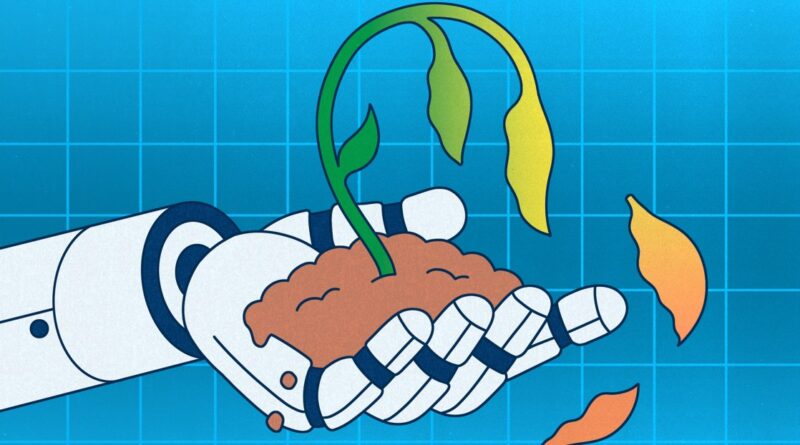AI is ruining houseplant communities online
“Maybe you could organize your plants like this,” my friend’s text message said, with an attached photo of white pots of plants floating midair in front of a huge, sunny window. As a newbie plant collector, I do need to organize my growing collection of flora, but not like this — the photo was AI-generated and the plants depicted were not real.
Even as a beginner, I was able to identify issues with the photo. Obviously, my plants cannot physically defy gravity, but most egregiously, the organizational method of putting plants in direct sunlight would completely incinerate their leaves. This was the first time I came across AI-generated plant content from well-meaning people who earnestly believe it is real, but its proliferation is a growing problem in plant-lover communities online and off.
While online retailers have often scammed less-knowledgeable consumers, the rise of online stores using AI-generated photos of fake, usually vibrant, and otherworldly-looking plants to fool consumers into buying seeds for plants that do not exist has been remarked upon by multiple plant-specific blogs, podcasts, and communities in the last three years.
The offer of pink pastel monstera seeds, a variation of a favorite houseplant that cannot be real because of the species’ lack of pink pigment genes, is a common scam online, with even Google’s AI assistant confirming its existence. AI-generated photos of bright red and blue hostas also often advertise seeds, but pigment genes that generate these vibrant colors do not exist, and hostas grown from seeds usually inherit unpredictable traits from their two parent plants. Even if these pigment genes existed, there would be no guarantee that you could feasibly create these plants from seeds.
“In the springtime we get customers asking about AI-generated plants multiple times a week,” says Casey Schmidt Ahl, engagement manager at the Colonial Gardens, a garden center in Phoenixville, Pennsylvania, who has published a blog post teaching plant owners how to spot fake AI plant scams online. “We always make sure that we tell them that it is an AI-generated — or at least heavily photoshopped — image, and that they need to be really careful because we know that if we just say we don’t have it, they are more likely to just go online and buy it.”
According to the post written by Ahl, one customer called in asking about a black bleeding heart plant. Ahl only had bleeding hearts — which have hanging petals that look like hearts dripping in liquid — in white and pink, so she searched for the black version online. The red flags were there: there was only one image of the plant across multiple websites, and there wasn’t specific information about the plant’s growth or variety.
Plant care misinformation regurgitated by AI chatbots and apps is also a common occurrence, according to Ahl. Plant care has always involved folklore and pseudoscience, Ahl explains, like dipping leaf cuttings into honey to help them grow roots or using cinnamon to heal plant wounds. AI is now a part of a larger misinformation ecosystem that includes plant influencers without cited sources repeating plant care myths and plant ID apps. When Ahl writes articles for the Colonial Gardens blog, she uses scholarly papers and growers’ guides as sources, but she says it is unclear where an AI-powered bot like ChatGPT is pulling its information from.
“It’s always important for us to be able to ground our advice in science,” Ahl says, adding that garden centers have already fallen behind the curve of connecting with clients because of plant influencers on social media who are able to go viral quickly but rarely cite scientific studies. Ahl sees AI-generated misinformation as a part of an ecosystem that discourages plant owners from talking to an expert face-to-face. “It’s disconnecting us further from reality, relationships with nature, and also our community.”
Ahl isn’t the only one who feels this way. Most plant communities on Reddit ban AI-generated images, and there are strong feelings against AI-generated plant care advice, which some community members say is often wrong and doesn’t take the human variable into account. Plant care can vary according to where the plant owner lives, whether the plant owner is a beginner or more experienced collector, and the gardening supplies that are immediately available. But most importantly, AI-generated content — both photos of fake plants and care misinformation — disrupt community engagement, which is what many collectors are seeking when joining these forums.
“Most people are looking to socially connect based on real lived experiences, in a community with others like you, otherwise it would be easier to simply Google a question for answers,” says Redditor known as Caring_Cactus, who moderates four plant-related subreddits, in a written interview. Moderators also struggle with AI automated content that is posted in large volumes by bots. “They create a lot of generic responses that are full of false information. Most people also view it as lazy and disingenuous with ulterior motives.”
This kind of content is “discouraging any meaningful engagement” because it’s not grounded in reality, Caring_Cactus continues. “They’re trying to farm attention with low quality content, and it creates less opportunities for real connection by wasting people’s precious time when they want to socialize online.”
There are also more existential issues that arise from AI-generated plants, as fake photos and AI-generated care hacks might take away the wonder of how special being a part of the growth and development of real plants can be. “There’s a lot of different reasons that people garden, including supporting wildlife and pollinators with native plants or growing their own food, and these AI images and scams are not really interested in connecting you with a broader goal,” Ahl says. Instead, this content wants to catch your attention through “a curiosity dopamine sort of response,” Ahl says, or even try to scam you into buying seeds for blue sunflowers.
Additionally, the use of AI-powered apps in gardening, where plants and the issues that might be killing them are identified through photos, is like taking a shortcut, which defeats the whole point of the hobby. “If instead of looking at your plants and making sure that they’re watered correctly or reaching out to an expert, you always just take a picture with your AI app and have it tell you what’s wrong, you are letting AI do the thinking for you and you’re not doing the full connection and the mindfulness of having plants,” Ahl adds.
AI-generated plant slop might also make magical-looking real plants look fake, risking the destruction of the wonder collectors feel toward new plant varieties. “This year they debuted the firefly petunia, which is a glow-in-the-dark petunia,” Ahl says, adding that, admittedly, this sounds like something that shouldn’t exist. The proliferation of AI-generated photos has resulted in an existential questioning of reality, and it might be driving us even further away from nature. “It definitely draws away from the majesty of plants because there are certainly lots of existing varieties that are amazing without having a galaxy pattern on their petals.”





